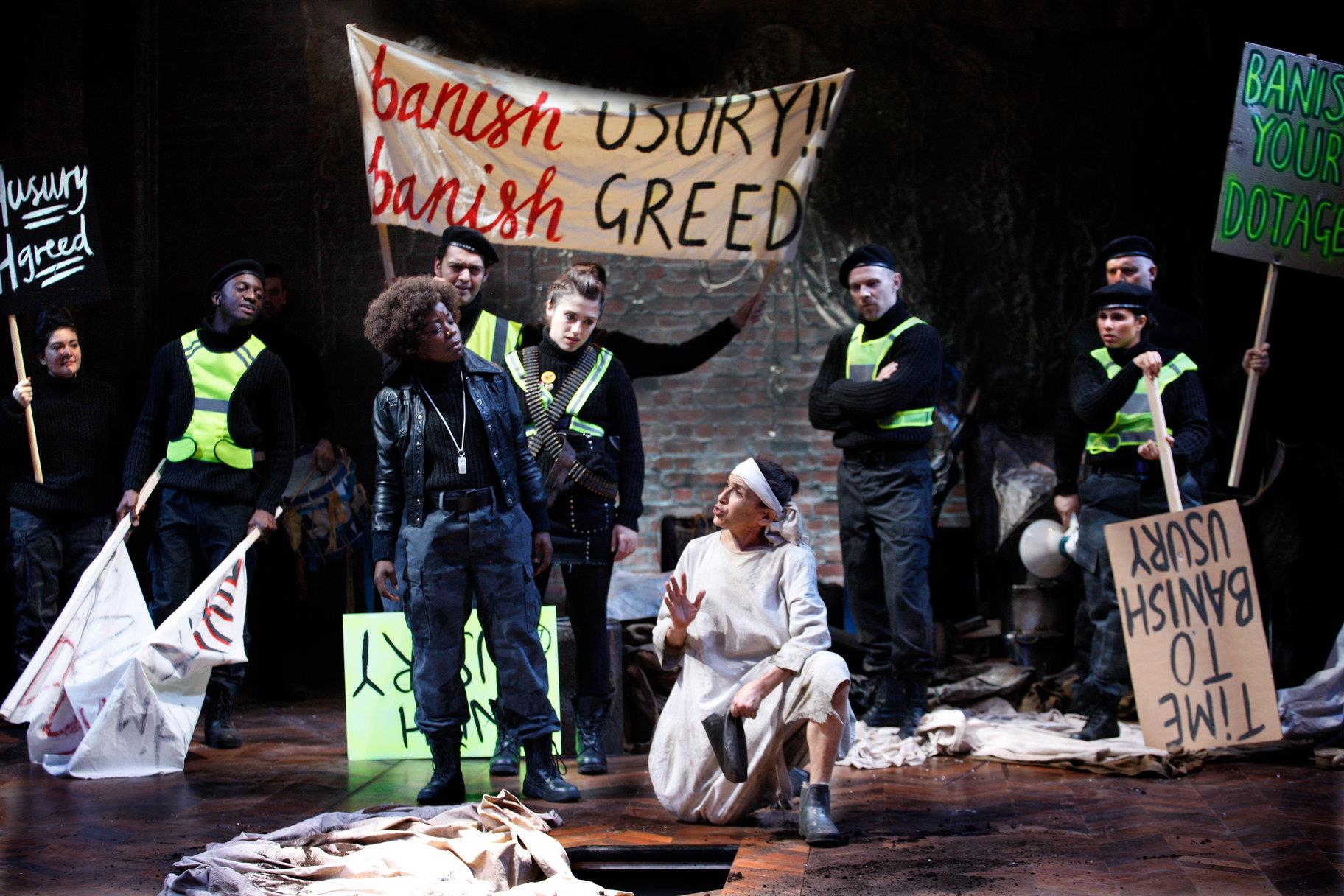 Recently, reviewing several of Shakespeare’s ‘problem’ works, my only difficulty has been finding enough superlatives. And so it is with director Simon Godwin’s rarely produced Timon of Athens. Pivotally, he casts against gender to make the transcendental Kathryn Hunter his Timon.
Recently, reviewing several of Shakespeare’s ‘problem’ works, my only difficulty has been finding enough superlatives. And so it is with director Simon Godwin’s rarely produced Timon of Athens. Pivotally, he casts against gender to make the transcendental Kathryn Hunter his Timon.
Written about the same time as Antony and Cleopatra and Coriolanus and set in ancient Greece, Timon is believed to be a collaboration between Shakespeare and Thomas Middleton. A script whose unpolished and probably unfinished state, could be due to it not being staged in its own era.
It is almost a fable – although don’t expect unequivocal simplicity: Timon exhausts her fortune with ridiculous generosity. Then, impoverished and instantly friendless she behaves equally excessively, living as a hermit in a cave, developing a total hatred of all mankind to the extent of financing an attack on Athens, before dying.
Here it’s pre-economic slump, modern Athens, a bling, boom town. Conspicuous consumption rules, stylish clothes and decor are modelled in gold, and flattery is unlimited – except when it threatens to involve giving rather than receiving. A picture also painted in word Imagery of gluttony and sexual decay.
Timon, generous to a fault, offends against common sense, hosting huge parties of pretentious freeloaders, buying expensive gifts for the undeserving rich, securing a friend’s prison release at immense cost but refusing his ready repayment. Then comes the fall and with it the eternal hypocrisy and wry humour associated with sinking ships, self-justifying phrases and awkward body language.
Traditionally Timon (he) is a confident self-deluding patrician, who becomes an incendiary bomb of hatred. What we get is Hunter: female, tiny in stature and with a low, foggy voice. Yet with warmth and domination of the stage apparent in her expressive hand movements, she provides the key to her character. A loner without family who becomes what she is by instinct and experience, not analysis – a buyer of friends, a hater of mankind.
That means fewer fireworks and less embittered shouting, but frequently greater credibility and no less humour, Hunter’s bubbling sense of fun, draws out all the irony aided by the direction. The false banquet scene in which the treacherous friends are humiliated, gains wonderfully from the use of a battery of fire extinguishers.
There’s humour and character contrast in the person of Apemantus a cynical philosopher, acted in another successful gender switch by Nia Gwynne. A caustic observer of a rotten society, who’d kill any party. The battle of insults in the cave is exhilarating, with Timon winning because her personality has been shaped by events, Apermantus’ by a life choice.
Less successful is the treatment of Alcibiades, a commander seeking redress for an alleged slight by the city fathers – another gender reversal, with Debbie Korley. Because here, she is as more political revolutionary than soldier, the contrast is lost between limited revenge and Timon’s mad obsession to eliminate mankind.
The faithful servants are the repositories of virtue in this unhappy world, aware of Timon’s inherent goodness. Riad Ritchie as her steward is touching as an old world, non-judgemental conservative. The feeling is heightened, when both he and the cynical Apermantus embrace Timon in their leaving.
The text includes much lesser poetry clumsily interspersed with prose and a sometimes failing narrative. Yet director Godwin and an outstanding cast make something memorable from it. And you might think the fable moral still appropriate, in a hypercritical age swinging from one extreme policy too another.
★★★★☆ Derek Briggs 10th January 2019
Photo by Simon Annand

